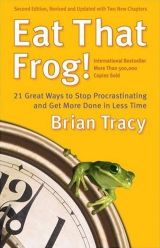


|
Eat That Frog!: 21 Great Ways to Stop Procrastinating and Get More Done in Less Time (BK Life) (平装)
by Brian Tracy
| Category:
Time management, Productivity, Self improvement, Personal success |
| Market price: ¥ 168.00
MSL price:
¥ 158.00
[ Shop incentives ]
|
| Stock:
Pre-order item, lead time 3-7 weeks upon payment [ COD term does not apply to pre-order items ] |
MSL rating:
 Good for Gifts Good for Gifts |
| MSL Pointer Review:
For people who are overwhelmed by tasks of all sizes, this book provides the 21 most effective methods for conquering procrastination and accomplishing more. |
| If you want us to help you with the right titles you're looking for, or to make reading recommendations based on your needs, please contact our consultants. |

|
| |
AllReviews |
  1 2 Total 2 pages 11 items 1 2 Total 2 pages 11 items |
|
|
Don Mictell (MSL quote), USA
<2006-12-26 00:00>
Is life more fun when your are excited and motivated? Can you get more done then?
What idea do you think Mr. Tracy uses to get you in that mood? You can probably guess from the title. He wants you to think about your biggest and most important challenge (that you are most likely to put off) as a big, ugly, live frog that you are going to eat first thing every morning. Now, that should really turn you on! No? Well, I guess you're not bloodthirsty enough to make a big success then.
All kidding aside, except for the poor choice of metaphor this is a pretty good book. It combines in 21 rules the key points from many people who have written well about time management including Peter Drucker, Alex Mackenzie, Alan Lakein, and Stephen Covey. So you can save a lot of time by reading this book instead of many others.
I would like to compliment Mr. Tracy for giving full credit to most of those whose ideas he uses, which he did not always do in the books he wrote in the past.
The sections are short in this book, and many pages are blank. Most people could read this book without rushing in less than two hours.
You are encouraged to use all 21 rules, and there's an exercise at the end of each rule to help you get experience. He feels that following these rules for 21 days will be enough to form a new set of habits. Many behavioral researchers would argue that it takes longer.
Mr. Tracy has applied all 21 of these rules in his own life, and testifies to their effectiveness. His key message is to spend your working time on what will do you the most good and skip doing the rest, and he gives you several ideas to identify what those areas are and how to make psychological and skill progress in them. For example, you should first do those things that will make you more successful in the key aspects of your job. To get more time to work on self-improvement, give up on watching television and listen to audio tapes on these subjects while driving.
The book has three minor weaknesses. First, time management is viewed as a discipline . . . with little emphasis on the inspirational. If you had to do something unpleasant to save the life of your child, you would easily feel inspired to do so. If you had to do the same thing to meet a personal plan for self-improvement, would you be inspired enough? Although the book talks about getting inspired, it seems to rely on a taste for self-discipline that many lack.
Second, Mr. Tracy writes in aphorisms that are often not explained. As a result, it isn't always clear what he is talking about. The material is highly condensed in this way, and you will often wonder why he is telling you what he is telling you. For example, he tells you to stay away from white flour. Now, unless you have read a lot about how white flour affects your blood chemistry to cause your blood sugar to crash and make you feel tired while your body burns less fat so you gain weight (which also makes you more sluggish), you would never be quite sure what all this has to do with time management
Third, Mr. Tracy's 21 rules could have easily been condensed into many fewer, which would have made them easier to remember and saved you time in learning how to apply them. He also projects many personal preferences onto everyone else. For example, he wants to be sure that you sit up straight as you work. I couldn't quite figure out how that helps with time management. Maybe you avoid having to see a chiropractor, and that saves time.
What is your idea of a compelling life? What would create a compelling life for you? What are you not yet doing that's necessary? Learn to hesitate to procrastinate about those things, then!
|
|
|
|
  1 2 Total 2 pages 11 items 1 2 Total 2 pages 11 items |
|
|
|
|
|
|